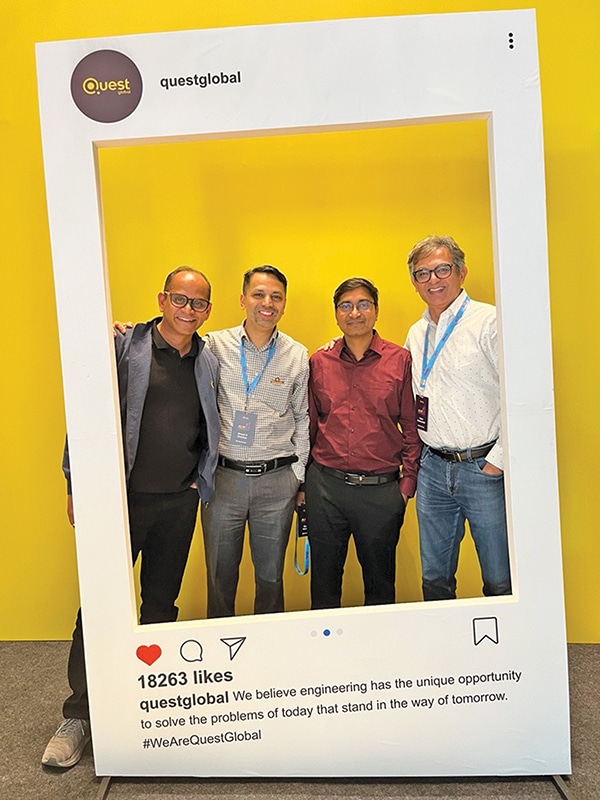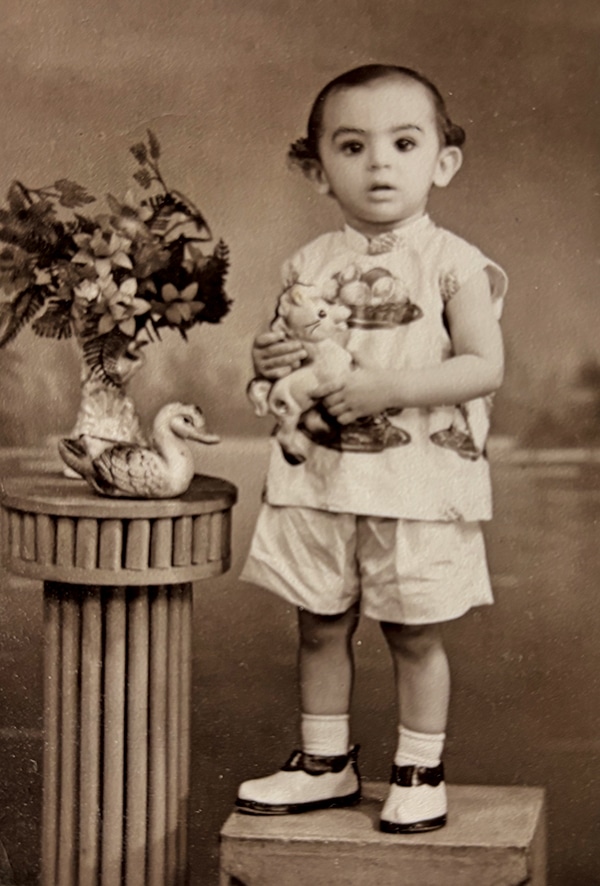
The life of Taher Madraswala is a story of an indomitable spirit—a man who survived hunger and adversity to support his family while building himself along the way. Now leading the semiconductor division at Quest Global, his journey stands as nothing short of extraordinary. This is his story as written by EFY’s Yashasvini Razdan…
Born into a family with a business at its core, young Taher’s birth coincided with his parents’ move from Madras to Calcutta. The eldest of three boys, Taher was a mischievous child, quite unlike the conventional eldest son expected to be responsible and disciplined. Up until the age of ten, Taher showed no entrepreneurial aspirations, nor any inclination towards academic brilliance. Scraping through exams and spending his time playing gully cricket, he relied on grace marks to pass from one grade to the next.
With a carefree zest for life, Taher enjoyed his childhood to the fullest—until everything changed when he was ten. His father, Husein Madraswala, watched a flourishing business collapse, plunging the family into financial ruin and putting an end to his innocent frivolities. With creditors lined outside their house and no money to pay for rent or even two square meals, young Taher’s childhood ended abruptly at the tender age of eleven. Abandoned by their fair-weather friends and relatives, Taher and his family were left to the mercy of the creditors amidst misfortune. With no money to pay for house rent, Taher and his family struggled to keep the rental apartment and pay for school fees. Desperate and hungry, it was at this juncture that Taher’s father suggested leaving Kolkata and going back to their ancestral village in Gujarat.
– Advertisement –

A question of survival
Taher and his mother, Shirin Madraswala, vehemently opposed this idea. “We had two choices—either return to our hometown in Gujarat, where my grandfather lived, because we could not afford to stay in an expensive city like Calcutta, or face starvation. My mother, despite being uneducated, was determined to educate her children. I believe that who I am today is largely because of her,” shares Taher.
But what could an eleven-year-old schoolboy do to provide for a family of five?
“My mother went around the locality asking for work for me. At 12 years old, all I could do was teach young kids. One kind lady in our neighbourhood gave me my first break and asked me to teach nursery rhymes to her son. She paid me one rupee per lesson, and since I worked every day, I earned 30 rupees in the first month. That was my first salary,” recalls Taher.
His income supplemented his mother’s earnings of 100 rupees from stitching and knitting. “Our total household income was just 130 rupees for the first few months. It was barely enough to survive—we could not even afford an egg a day for our family of five. We did not have proper clothes, and we could not even pay our school fees,” he recalls. While survival was somehow contrived, the purpose of this hand-to-mouth living was to ensure that no Madraswala kid would have to forego their education. Taher’s parents approached the principal of St. Joseph’s College in Bowbazar, requesting assistance with school fees or a possible reduction.
“Our principal agreed and allowed us to continue on the condition that we would pay the fees whenever we could, with an extension of up to two years to clear our dues,” he says.
However, Brother James also warned Taher about his academic performance. “Up until seventh grade, I was just scraping by. If I passed, my mother would celebrate by distributing sweets at home. That was the bar we had set!” he smiles, recalling his youthful idiosyncrasies.
This warning, coupled with a mere thirty rupees as salary, forced Taher to rethink his choices.
“Baa Baa Black Sheep was simple, but 30 rupees a month was not enough! So, I started teaching first graders, then second graders, and eventually third graders. Within a year, I developed a knack for teaching, and instead of teaching one child, I started tutoring six or seven. My earnings increased to more than 300 rupees per month. We were finally able to pay our school fees, though we still could not afford rent or proper meals,” he narrates.
By the time he reached the ninth and tenth grades, he had established himself as a trusted tutor in the locality. “People paid me 100 to 120 rupees per student, and I had 10-12 students, earning around 1000 rupees a month. This was a significant amount at that time, during 1977-79. With this income, we could pay off old debts and slowly stabilise our lives.”

Choosing duty over dreams
With a flourishing tutoring business, young Taher had found a way to support his family whilst continuing his education. But as he finished school, a critical question loomed—what next?
Taher’s first preference was medicine. “I had heard that doctors earned well and were highly respected. Coming from a business community, there were no engineers or doctors in my family, so I thought this would be a good path,” he recalls.
However, his father had other plans. “My father insisted that I pursue engineering instead of medicine. He believed that becoming a doctor would take too long—seven to eight years—whereas engineering was a shorter route. He also worried that if I studied medicine, our household income would drop because I would not be able to earn while studying,” says Taher.
Once again, responsibilities presided over aspirations. Taher respected his father’s decision and enrolled in an engineering programme. But even as an engineering student, his mind constantly worked on ways to sustain himself. While his peers were busy forming friendship bonds, Taher was consumed with a more significant concern—survival. “I had no money. My biggest worry was how to earn while studying. Since I joined Aligarh Muslim University late in the academic year, I had to quickly find a way to earn while maintaining my grades and attendance. I needed to find students, but this was a new city where no one knew me,” he says.
Instead of befriending classmates, he strategically built relationships with decision-makers — the warden, professors, and school administrators. Within three weeks, he had secured his first tutoring job, teaching a teacher’s child from Lady Fatima School, one of the most prestigious schools in Aligarh.

“That was my breakthrough. Once I started teaching her children, she recommended me to others,” he shares. This network of students kept growing, and before long, he was once again balancing a full-fledged tutoring business alongside his engineering studies.
“My classes would finish at 3 pm. I would then return to my hostel and cook dal-chawal or quickly gobble a couple of rotis and sabzi delivered from the kitchen, and by 4pm I was out again, teaching students till 10pm. I did this every single day for five years. When you have responsibilities beyond yourself, you stop making excuses. You just do what needs to be done,” he reflects, pausing to wipe his moist eyes.
His childhood burdens never gave Taher the luxury of dreaming for himself, but dreams have a way of slipping into the mind, uninvited yet persistent. For Taher, a poster of the New York skyline hanging in the college canteen drew stars in his eyes, which up until now hadn’t even gotten a chance to tear up amidst adversity. Every time he sat there, his eyes would drift toward it, mesmerised by its magnificence. “Ek din wahaan toh jaana hi hai!” he would think to himself. The boy who had once been consumed by survival now dared to dream of the Big Apple.
He had a dream; he worked for it
Oops! This is an EFY++ article, which means it’s our Premium Content. You need to be a Registered User of our website to read its complete content.
Good News: You can register to our website for FREE! CLICK HERE to register now.
Already a registered member? If YES, then simply login to you account below. (TIP: Use ‘forgot password’ feature and reset and save your new password in your browser, if you forgot the last one!)









